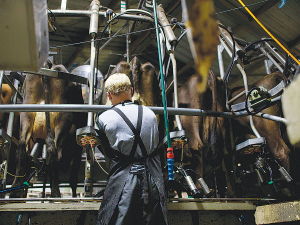Genetics, Efficiency and Performance: How the Burgesses are raising the bar at Te Poi
Bill and Michelle Burgess had an eye-opening realisation when they produced the same with fewer cows.
 One of the main reasons for a shift to flexible milking is to reduce hours, make rosters more flexible and improve work.
One of the main reasons for a shift to flexible milking is to reduce hours, make rosters more flexible and improve work.
With milkings typically taking around 17 to 24 hours a week per worker, many farmers have been focusing on milking smarter to reduce hours and creative ways to shorten the working week - like the 22% who report they are using flexible milking.
One of the milking reasons for a shift to flexible milking is to reduce hours, make rosters more flexible and improve work/life balance for their team.
For Taranaki farmers Daryl and Karyn Johnson, using 3 in 2 milking has seen their team's working week shortened by six hours each per week. Many farmers are also having success with a 10 in 7 milking schedule that maintains traditional morning and afternoon milking times but frees up a few afternoons each week.
Milking smarter has seen some operations introducing a maximum milking time (MaxT), which can reduce milking times without compromising production or udder health. Interestingly, leaving some milk behind in slow milking cows can increase the flow rate in the next milking, improving milking efficiency.
Fonterra suppliers recently received Insights reports showing their milking efficiency compared to similar operations, and how much time they could save by reaching 80-100% milking efficiency. The average possible saving at peak was 8 hours per week.
Align Farms in Mid-Canterbury allow their team to pick shifts, with the first pick rotating between staff, usually with the most popular shifts being morning and midday, leaving afternoons free.
Flexible rostering means the team control their working week, allowing them to pick shifts around other commitments and hobbies, while also allowing Align Farms to take on people looking for work opportunities, including part-time positions. They describe these workers as some of the smartest people, and the farm benefits from having a diverse and interesting workplace.
Reducing the hours your people work to 50 hours or less a week reduces stress, fatigue, and the risk of accidents, and helps you attract and keep good employees.
For more information visit www.dairynz.co.nz/milking
Seonaid Aitchison is DairyNZ solutions and development specialist.
OPINION: The year has started positively for New Zealand dairy farmers and things are likely to get better.
Ministry for Primary Industries (MPI) Director General Ray Smith believes there is potential for an increase in dairy farming in New Zealand.
New Zealand's new Special Agricultural Trade Envoy, Horowhenua dairy farmer, company director and former Minister of Agriculture, Nathan Guy says the Free Trade Agreement (FTA) with India is a good deal for the country.
New figures show dairy farmers are not only holding on to their international workforce, but are also supporting those staff to step into higher-skilled roles on farm.
New tractor deliveries for 2025 jumped 10% compared to the previous year, a reflection of the positive primary sector outlook, according to the Tractor and Machinery Association (TAMA).
Entries have opened for two awards in the New Zealand Dairy Industry Awards (NZDIA) programme, aimed at helping young farmers progress to farm ownership.